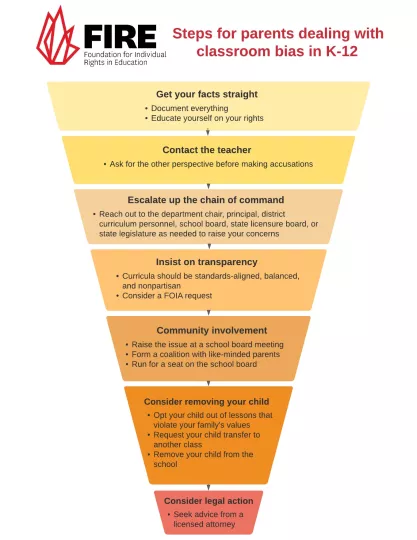Table of Contents
Action sheet for confronting school indoctrination
- Stay plugged into what’s going on at your child’s school. Review your children’s assignments. Read all school communication closely and inspect the language carefully. Your definition of a word may differ drastically from the school’s.
- Document everything. Assume good intentions (until proven otherwise), but verify. Don’t automatically believe everything your child tells you without seeking confirmation. You don’t want to make a misinformed accusation.
- Educate yourself on parental rights, student rights, ethical guidelines governing the teaching profession and the limits of teacher speech in the classroom.
- When you have a concern, follow the proper chain of command. Start with the classroom teacher and give him/her a chance to explain. If unsatisfied, escalate to the department chair, principal, district office, superintendent, and/or school board. Ultimately, if your complaints are still unaddressed, you can make complaints to the state’s licensing and disciplinary board.
- Insist on total transparency from the school regarding lessons and curriculum. Use the Parental Transparency Protocol to ensure complete honesty. Use open records requests and invoke sunshine laws if schools are attempting to hide facts.
- Learn how to locate the learning standards for your child’s grade in your state (usually located on your state’s department of education website) and confirm that lessons adhere to them. Public school teachers are paid with tax dollars to instruct according to established state and district standards; anything else is a misuse of public funds.
- If you’re dealing with a hostile teacher or school, insist on pre-notification of lessons or programming that deal with personal values, morals, or attitudes. Opt out of any planned lessons that violate your family’s values and insist upon the provision of a suitable learning alternative for your child.
- Ask to have your child reassigned from a problematic classroom. An open records request may show if other parents have done the same. If you are considering legal action, consult a licensed attorney in your state. You will need to prove that the school broke a law.
- Take concerns about student mental health in a politicized classroom to the school counselor, who is responsible for the emotional wellbeing of students in school.
- Start attending school board meetings regularly. Better yet: run for school board!
- Organize. It’s easy to ignore one parent, but much harder to ignore two, ten, or twenty. Here are some groups that have already formed to combat biased instruction in K-12.
- Propose that your child’s school adopt a free speech and/or critical thinking statement.
- Survey your child and others (anonymously) about their experiences. Take results to the school board. Have your child evaluate their teachers for their classroom fairness. (You can also use RateMyTeachers.com.) Share results with administrators.
- Take bad lessons public. Sunshine is often the best disinfectant.
- Stay in contact with your local legislators. Some states are now proposing new learning standards that will completely alter traditional educational aims. They need to hear from you to know what matters to you!
Condensed from Undoctrinate: How Politicized Classrooms Harm Students and Ruin Our Schools—and What We Can Do About It. by Bonnie Kerrigan Snyder, D.Ed., Director of FIRE’s High School Outreach.


